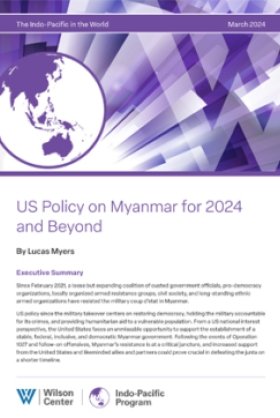Political Stability, Conflict Resolution, and Development in Southern Africa
Joaquim Alberto Chissano, President of the Republic of Mozambique.
Overview
Director's Forum with Joaquim Alberto Chissano, President of the Republic of Mozambique.
President Chissano emphasized the fact that peace and stability are prerequisites for economic development in Southern Africa. Mozambique, in its role as leader of the Southern African Development Community (SACD) Organ on Politics, Defence, and Security is leading the charge of creating the structures, mechanisms, and procedures for conflict prevention, resolution, and management, in accordance with the SADC Protocol on Politics, Defense, and Security.
According to Chissano, SADC has been actively building peace in the region. The "Extended Troika" is leading the democratic restoration process in Lesotho; elections are scheduled for May. Another taskforce was created on Zimbabwe with the objective of helping the country to peaceably enact land reform and hold presidential elections.
SADC nations are committed to economic and political reforms which include a free market, rule of law, and respect for human rights. Yet, Chissano pointed out that each nation is in a different phase of progress in these areas and will thus experience different degrees of difficulty in democratizing their societies. "Our approach should be of encouragement rather than pressure or criticism," Chissano said.
Mozambique is working to promote dialogue among the conflicting parties in the Democratic Republic of the Congo (DRC). It is very important that the Inter-Congolese Dialogue under the leadership of Sir Ketumile Masire be successful and that the Lusaka Agreement is implemented, with a focus on the withdrawal of foreign troops and disarmament. "Confidence building is a very complex process that calls for perseverance, resolve, commitment, and a spirit of tolerance by all parties to the dialogue."
Success in the DRC is crucial to build a positive environment for peace in Angola as well. Chissano urged UNITA to seize the new opportunity for peace that has presented itself now that Savimbi is gone. With regard to Zimbabwe, Chissano's government recognizes the legitimacy of land reform there and urges the international community to unconditionally support a comprehensive and effective process of agrarian reform, including the redistribution of land. Chissano went on to say that the sanctions imposed on the country are only making it harder for democracy to take hold there.
Chissano underscored the reasoning that underdevelopment and poverty lead to violent conflict. "Thus, all efforts leading to combat poverty and strengthen inclusiveness in the development process will contribute to conflict prevention and resolution." According to Chissano, the New Partnership for Africa Development (NEPAD) is an important tool to begin a new era of partnership and cooperation between Africans. In Mozambique, a program for poverty reduction, PARPA, brings together the strategic plans of those sectors vital to poverty reduction such as agriculture, education, health, infrastructure, public sector and judiciary reforms, as well as macro-economic stability.
Chissano ended his speech with a list of lessons for a successful transition from war to peace and development. The list included the promotion of a culture of peace and tolerance, the preservation of a permanent dialogue, the participation of civil society and community organizations in domestic affairs, and the development of a partnership with donors including recipient ownership.
Drafted by Lauren Crowley
Hosted By

Africa Program
The Africa Program works to address the most critical issues facing Africa and US-Africa relations, build mutually beneficial US-Africa relations, and enhance knowledge and understanding about Africa in the United States. The Program achieves its mission through in-depth research and analyses, public discussion, working groups, and briefings that bring together policymakers, practitioners, and subject matter experts to analyze and offer practical options for tackling key challenges in Africa and in US-Africa relations. Read more
Thank you for your interest in this event. Please send any feedback or questions to our Events staff.









